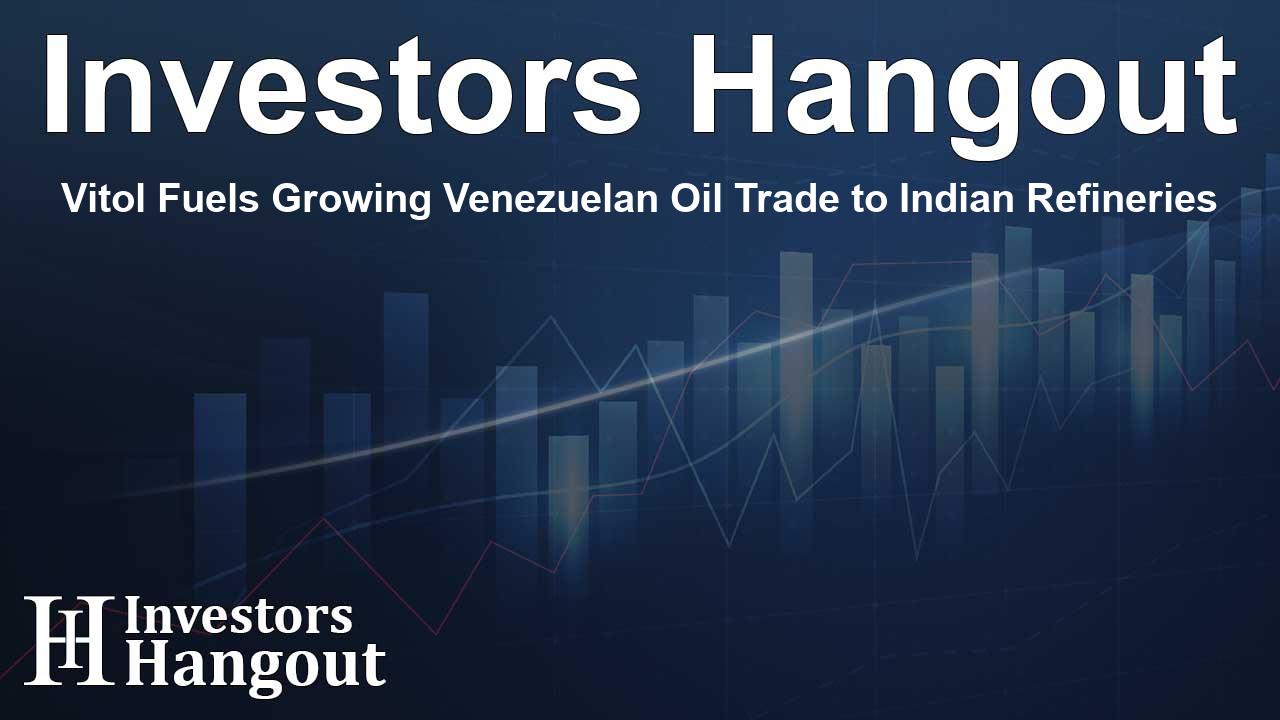Vitol Fuels Growing Venezuelan Oil Trade to Indian Refineries

Vitol's Bold Move in Venezuelan Oil Trade
Recent developments in the oil industry highlight the increasing collaboration between trading houses and refiners across borders. Notably, Vitol has sold 2 million barrels of Venezuelan crude to two Indian refiners for delivery in November. This transaction signifies a notable resurgence in oil shipments to one of Venezuela's key markets, which had previously seen reduced activity.
Indian Refiners Embrace Venezuelan Crude
In light of recent authorization from the U.S. Treasury Department permitting transactions for Venezuelan crude and fuel, Indian refiners are once again looking toward Venezuelan oil. This decision comes amidst ongoing sanctions aimed at President Nicolas Maduro's regime, which complicates the purchasing environment.
Among the refiners involved, the Indian Oil Corporation (IOC) is set to receive the largest share of this shipment, with 1.2 million barrels en route. Complementing this, Mangalore Refinery and Petrochemicals (MRPL) will acquire 800,000 barrels. These significant purchases reflect a shift in trade dynamics as Indian companies adapt to changing geopolitical scenarios.
Understanding the Shipments
The crude being transported is of the Merey 16 grade, loaded on the vessel Boston for MRPL. While IOC boasts a processing capacity of 300,000 barrels per day specifically suited for Venezuelan oil, MRPL has historically shown a hesitance towards heavier grades like Merey. This trend indicates a complex landscape of oil refineries and their preferences regarding the grades of crude they handle.
Reliance Industries Resumes Trade
As the market evolves, major players like Reliance Industries Ltd are also stepping back into the Venezuelan oil market. After obtaining authorization to resume imports, Reliance has been engaging in deals that involve swapping Venezuelan oil for heavy naphtha, a vital component for PDVSA’s operations.
Notably, just last month, Reliance successfully received a cargo of Venezuelan oil on the vessel Degas, adding another layer to its revitalized oil trading activities.
The Role of Intermediaries
The complexities of oil trading mean that not all transactions are straightforward. Reports indicate that cargoes sold by PDVSA, the Venezuelan state oil company, often involve intermediaries who assist in the resale to other traders. This strategy is particularly prevalent among PDVSA’s joint venture partners in Europe, who possess the necessary licenses to lift Venezuelan oil. Such dynamics add a layer of intricacy to the overall picture of oil logistics.
Future Prospects for Venezuelan Oil Imports
As Indian refiners continue to explore options for Venezuelan crude, the overall outlook suggests a sustained interest from both parties. The lifting of specific trade restrictions has encouraged refiners to navigate through existing hurdles, setting a hopeful precedent for future transactions.
Despite the challenges posed by sanctions and regulatory frameworks, this development points toward a revitalized engagement between the Indian and Venezuelan oil sectors, with trading houses like Vitol playing pivotal roles in facilitating these exchanges.
Frequently Asked Questions
What role does Vitol play in the oil trading market?
Vitol is a leading global energy and commodity trading company, known for facilitating transactions in crude oil, among other resources.
Why are Indian refiners importing Venezuelan oil again?
Recent U.S. Treasury Department authorizations have allowed Indian refiners to resume imports of Venezuelan crude oil despite historical sanctions.
What types of oil are being imported from Venezuela?
The shipments consist primarily of Venezualan crude oil grade Merey 16, which is suitable for processing by Indian Oil Corp and other refiners.
How does the oil swap with Reliance work?
Reliance's oil swap involves exchanging Venezuelan crude for heavy naphtha, which is used to dilute extra heavy oil and produce exportable grades.
What challenges are faced in importing Venezuelan oil?
Challenges include navigating sanctions, understanding legal frameworks, and ensuring compliance with diverse regulations surrounding oil transactions.
About Investors Hangout
Investors Hangout is a leading online stock forum for financial discussion and learning, offering a wide range of free tools and resources. It draws in traders of all levels, who exchange market knowledge, investigate trading tactics, and keep an eye on industry developments in real time. Featuring financial articles, stock message boards, quotes, charts, company profiles, and live news updates. Through cooperative learning and a wealth of informational resources, it helps users from novices creating their first portfolios to experts honing their techniques. Join Investors Hangout today: https://investorshangout.com/
Disclaimer: The content of this article is solely for general informational purposes only; it does not represent legal, financial, or investment advice. Investors Hangout does not offer financial advice; the author is not a licensed financial advisor. Consult a qualified advisor before making any financial or investment decisions based on this article. The author's interpretation of publicly available data shapes the opinions presented here; as a result, they should not be taken as advice to purchase, sell, or hold any securities mentioned or any other investments. The author does not guarantee the accuracy, completeness, or timeliness of any material, providing it "as is." Information and market conditions may change; past performance is not indicative of future outcomes. If any of the material offered here is inaccurate, please contact us for corrections.